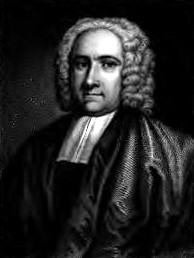Benjamin Grosvenor (minister) facts for kids
Benjamin Grosvenor (1676–1758) was an important English minister who didn't follow the main Church of England. He was known for his strong beliefs and his work for religious freedom. He was also a writer and a respected speaker.
Contents
Early Life and Education
Benjamin Grosvenor was born in London on January 1, 1676. His father, Charles Gravener, was a successful upholsterer. Later in life, his father faced money problems, and Benjamin supported him. Benjamin changed the spelling of his last name first to Gravenor in 1710, and then to Grosvenor in 1716.
When he was young, a sermon in Southwark deeply affected him. At 14, he was baptized and joined a Particular Baptist church. His minister, Benjamin Keach, encouraged him to become a minister himself.
In 1693, Benjamin went to Attercliffe Academy to study. While there, he decided to become a Presbyterian. Presbyterians have a different way of organizing their churches compared to Baptists. After returning to London in 1695, he continued his studies with private teachers. He even learned Hebrew from a French refugee named Cappel. Because of his change in beliefs, he was no longer a member of his Baptist church.
Becoming a Minister
In 1699, Benjamin was approved by seven Presbyterian ministers to start preaching. He became an assistant minister in Southwark. In 1700, he tried to become the main minister at a church in Stepney, but his earlier removal from the Baptist church might have affected his chances.
In 1702, Benjamin became a lecturer for young men at the Old Jewry meeting-house. He became very popular as a preacher. In 1704, he was chosen to be the main minister of the Presbyterian church in Crosby Square. He was officially ordained there on July 11, 1704. His church grew, and they were good at raising money for their work. He had several assistants over the years, including Samuel Wright and Edmund Calamy IV.
Benjamin also gave up his lecture role at Old Jewry. For some years, he preached at the Weigh House on Friday evenings. In 1716, he also started preaching at the "merchants' lecture" at Salters' Hall.
Later Life and Influence
In 1723, Benjamin Grosvenor was chosen as a trustee for Dr. Williams's foundations, which supported education and religious causes. In 1726, he had an operation that affected how he spoke. In 1730, the University of Edinburgh gave him the title of D.D., which stands for Doctor of Divinity. This is a high academic degree in theology.
In 1735, he gave lectures at Salters' Hall against Popery (a term used to describe the Roman Catholic Church at the time), focusing on the idea of persecution. He also wrote for a newspaper called the Old Whig. In 1749, he retired from his church and his lectures.
Benjamin Grosvenor believed in people with different religious views getting along. His own beliefs were a moderate form of Calvinism, a branch of Protestantism. He passed away on August 27, 1758, and was buried in Bunhill Fields. He left money to a Presbyterian fund and his library (collection of books) to Warrington Academy.
Important Writings
Benjamin Grosvenor was involved in creating a series of papers called the Occasional Papers starting in 1716. These papers, also known as the "Bagweell" papers, discussed important topics like "Bigotry." This series continued until 1719 and was very important for promoting religious liberty (the freedom to practice your own religion).
He also wrote a document in 1719 that explained the events at Salters' Hall. This document was the first of many pamphlets written by ministers who supported religious freedom.
Benjamin Grosvenor wrote many other things, mostly single sermons (speeches given in church). Some of his well-known works include:
- A Confession of Faith, 1704 (written for his ordination).
- The Temper of Jesus, 1712.
- Observations on Sudden Death, 1720.
- The Mourner, 1731 (this book was very popular and had many editions).
- Health, an Essay on its Nature, 1716.
His collected sermons were published in a volume in 1809.
Family Life
Benjamin Grosvenor was married twice. His first wife was Mary South, whom he married in 1703. They had a son, Benjamin South Grosvenor, who died before his father, and a daughter who died as a baby. Mary passed away in 1707.
In 1712, he married Elizabeth Prince. They had four sons, but only the youngest outlived Benjamin.
 | Delilah Pierce |
 | Gordon Parks |
 | Augusta Savage |
 | Charles Ethan Porter |


